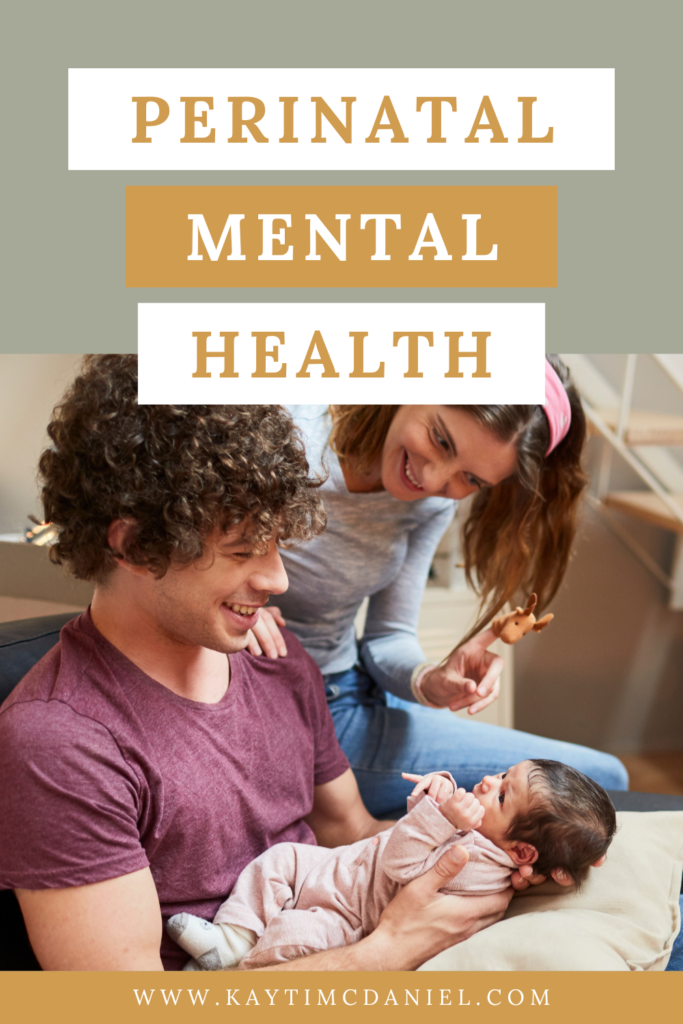
If you’re a new parent looking for mental health support, you may have stumbled across the term “perinatal mental health.” Here’s what it means.
“Perinatal” means “around birth,” referring to pregnancy and the postpartum period.
Pregnancy includes a wide range of experiences and outcomes.
Experiences of pregnancy are as diverse as we are. Sometimes, pregnancy involves the 40ish-week period leading up to a baby’s birth. Other times, pregnancy-related experiences may include fertility challenges or pregnancy loss. Every experience is challenging in its own ways and is deserving of support.
The postpartum period is a year or so after birth.
Depending on the context, “the postpartum period” may refer to different lengths of time. Many of us in the United States think of the postpartum period as lasting six weeks (since that’s when a follow up appointment is typically scheduled with your OBGYN after giving birth). Some would argue that a person is ALWAYS postpartum after having a child, emphasizing the forever-life-changing nature of this event.
In the context of perinatal mental health, the postpartum period typically refers to the year or so after birth, since that’s when new parents are at the greatest risk for pregnancy and birth-related mental health challenges.
Mental health refers to our emotional, psychological, and social wellbeing.
Mental health is NOT the same as mental illness.
While the terms “mental health” and “mental illness” are often used interchangeably, they have two different meanings. We all have mental health in the same way that we all have physical health. And, like physical health, mental health exists on a spectrum that includes various degrees of health AND illness.
We all struggle with our mental health sometimes.
We all experience stressors in life. Sometimes, the demands of those stressors overwhelm our ability to cope. When that happens, you may experience a range of mental health challenges such as:
- feeling overwhelmed by intense emotions.
- feeling restless, on edge, and unable to relax.
- having intrusive, unwanted thoughts.
- losing interest in people/activities you used to enjoy.
- changes in your appetite (eating much more or less than usual).
- changes in your sleep (sleeping much more or less than usual).
When we get stuck in these experiences, it can have a negative impact on our relationships, career, physical health, and day-to-day lives.
Taking care of our mental health is an ongoing process.
The choices we make every day have the potential to impact our mental health for better or worse. Sometimes mental health support (like therapy) can be a helpful tool to better understand those choices. When we have a better understanding of our choices, we can approach them thoughtfully rather than on autopilot. Like with our physical health, it takes time and intention to feel our best.
Perinatal mental health is for all new parents (not just moms).
Historically, perinatal mental health has often centered new and expectant mothers. However, this term also refers to the mental health of:
- pregnant people of all genders.
- new fathers.
- new nonbinary parents.
- new adoptive parents.
- birth parents who have recently placed a child for adoption.
- parents who have experienced a pregnancy or infant loss.
- people who wish to be parents (are experiencing fertility challenges and/or trying to conceive).
If you identify with any of the above experiences, perinatal mental health is for you.
Looking for mental health support for your transition to parenthood?
Whether you’re searching for a therapist trained in perinatal mental health, a free support group, or additional resources, know that you don’t have to do this new parent thing alone. Check out this post to find perinatal mental health support near you.